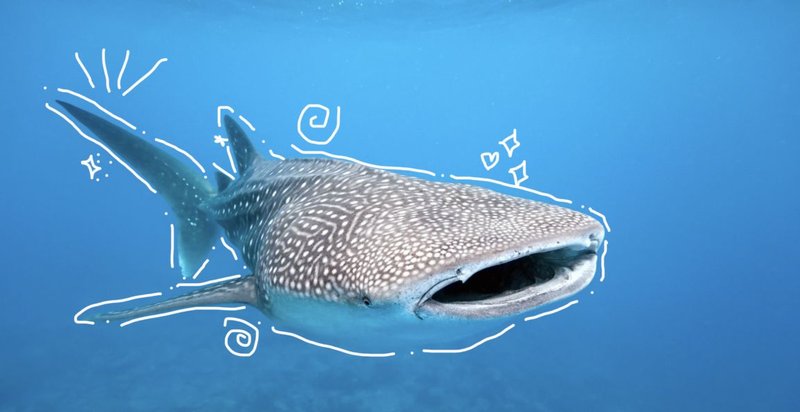
These myths and beliefs vary widely across different cultures, reflecting how people interpret the world around them. Some see the whale shark as a symbol of good fortune, while others may view it through a lens of fear or misunderstanding. Let me explain what makes these creatures so special and how various cultures celebrate—or misinterpret—them.
Whale Sharks: The Gentle Giants of the Ocean
It’s hard not to feel a sense of awe when encountering a whale shark. These creatures are the largest fish in the world, often swimming gracefully through the waters of tropical seas. Their diet consists mainly of plankton, which they filter through their gills. This brings to mind a huge vacuum cleaner gliding through the ocean—almost like nature’s own gentle giant! Yet, despite their size, whale sharks pose no threat to humans, which is a common misunderstanding.
Often, folks think that because these sharks are massive, they must be dangerous. That’s where the first myth comes in: that whale sharks can attack humans. In reality, they are quite the opposite. They are known for their docile nature and curiosity toward swimmers. Encounters with whale sharks are usually safe and even exhilarating for those lucky enough to share the water with them.
Myth of the “Man-Eater”
The idea of the whale shark as a “man-eater” is deeply ingrained in some cultures, fueled by fears surrounding all sharks. You might be wondering, why do people believe this? The answer often lies in how movies and media portray sharks in general. The idea of a fearsome predator lurking in the depths can be exciting for a film, but it creates misconceptions in real life.
In places where shark fishing is prevalent, myths are often exaggerated to justify their capture. In some coastal villages, locals may believe that killing whale sharks will bring bad luck or anger the sea gods. This contradiction creates a mix of fear and reverence surrounding these creatures, complicating how they’re treated in both culture and conservation efforts.
Whale Sharks and Good Fortune
On a brighter note, many cultures view whale sharks as symbols of luck and prosperity. For instance, in some parts of Southeast Asia, seeing a whale shark while fishing is considered a sign of a bountiful catch ahead. Fishermen regard these creatures with honor and respect, often sharing stories of their encounters as good omens.
The whale shark’s peaceful demeanor adds to its status as a good luck charm. Believers often feel inspired to protect these gentle giants, seeing them as part of their community’s well-being. Just as you might wish on a shooting star, encountering a whale shark can become a treasured moment that brings joy and hope.
Whale Sharks in Folklore
Folklore surrounding whale sharks varies widely. In some Pacific Island cultures, whale sharks are thought to be the reincarnations of human ancestors, swimming through the ocean to watch over their descendants. Stories portray them as guardians of the sea, embodying the spirit of the ocean itself.
These tales serve a dual purpose: they elevate the whale shark’s status while reminding communities of the importance of respecting marine life. The connection between humans and these creatures fosters a sense of guardianship, encouraging conservation efforts to protect their habitats. When you weave a narrative that includes respect and reverence, people are often more willing to advocate for preservation.
Scientific Misunderstandings
While cultural beliefs shape our views, scientific misunderstandings can also cloud the reality of whale sharks. One common misconception is that they can be found in polar waters. While it’s tempting to think that such a large creature could thrive anywhere, whale sharks prefer warm, tropical waters where plankton blooms flourish.
Additionally, some folks believe that whale sharks are closely related to great white sharks or tiger sharks, which couldn’t be farther from the truth. They’re actually more closely related to the gentle, small-bodied fish like the reef shark. This misunderstanding can lead to further fear and misconceptions about their behaviors and habits.
Conservation and Awareness
With growing awareness of the whale shark’s plight due to overfishing and habitat loss, many cultures have begun to shift their perspectives. Conservation efforts are ramping up, encouraging people to view these remarkable creatures through a new lens. This change means understanding their role within the marine ecosystem and recognizing their value beyond myths and fears.
Organizations and local governments are promoting sustainable practices, allowing communities to benefit from eco-tourism. When people can visit whale sharks in their natural habitat responsibly, it sparks an appreciation for their existence rather than fear. This positive interaction can lead to better protection for these gentle giants.
The Future of Whale Sharks and Cultural Perspectives
As our understanding of whale sharks continues to grow, so does the opportunity to reshape cultural beliefs surrounding them. Education plays a vital role in debunking myths. When people are equipped with factual knowledge, fears can be replaced by fascination.
People might be drawn to the ocean not just for its beauty, but for the stories it holds. By sharing accurate information about whale sharks, we can foster a culture of respect and admiration for these creatures. Imagine a world where whale sharks are celebrated for their wonders rather than misunderstood. That’s the future anyone can get behind!
In conclusion, whale sharks are truly amazing animals, rich in myths and cultural significance. From being seen as symbols of luck to being misunderstood as threats, these beliefs reveal much about human perspectives. As we learn more, it’s essential to spread awareness and protect these incredible creatures for future generations. Together, we can celebrate the beauty of whale sharks while ensuring they remain a cherished part of our oceans.

